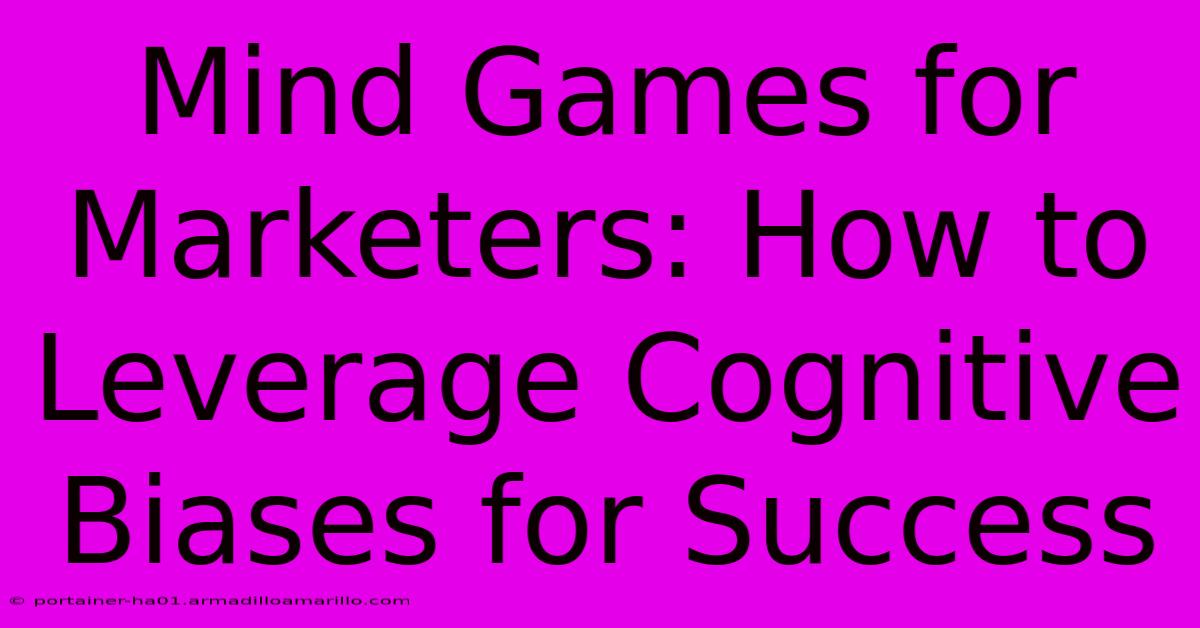Mind Games For Marketers: How To Leverage Cognitive Biases For Success

Table of Contents
Mind Games for Marketers: How to Leverage Cognitive Biases for Success
Marketing is a battle for attention. In a world saturated with messages, simply shouting louder isn't enough. To truly connect with your audience and drive conversions, you need to understand the psychology behind their decisions. That's where leveraging cognitive biases comes in. This isn't about manipulation; it's about crafting marketing strategies that resonate deeply with how people actually think and make choices.
Understanding Cognitive Biases: The Secret Weapon of Persuasion
Cognitive biases are systematic errors in thinking that affect our decisions and judgments. They're essentially mental shortcuts our brains use to process information quickly, but these shortcuts can lead to predictable patterns of behavior. Marketers can use this predictable behavior to their advantage.
Key Biases to Leverage:
-
Anchoring Bias: This bias refers to our tendency to rely too heavily on the first piece of information we receive (the "anchor") when making decisions. Example: Listing a higher-priced item alongside a lower-priced one makes the lower-priced item seem like a better deal.
-
Bandwagon Effect: People are more likely to adopt a belief or behavior if they see that many others are doing it. Example: Testimonials and social proof (e.g., "9 out of 10 customers recommend...") tap into this bias.
-
Loss Aversion: The pain of losing something is felt more strongly than the pleasure of gaining something of equal value. Example: Highlighting what customers stand to lose by not purchasing your product (e.g., "Don't miss out on this limited-time offer!") is far more effective than solely focusing on what they gain.
-
Framing Effect: How information is presented significantly impacts how it's perceived. Example: Phrasing something as 90% fat-free sounds much more appealing than phrasing it as 10% fat.
-
Scarcity Principle: Limited availability increases perceived value. Example: Using phrases like "Limited stock" or "While supplies last" creates a sense of urgency and encourages immediate purchase.
Applying Cognitive Biases in Your Marketing Strategy
Knowing about cognitive biases is only half the battle. The real challenge is applying this knowledge effectively. Here's how:
1. Craft Compelling Narratives:
Stories tap into our emotions and make information more memorable. By framing your product or service within a compelling narrative, you bypass rational decision-making and connect with your audience on a deeper level.
2. Master the Art of Social Proof:
Use testimonials, reviews, and social media mentions to showcase the popularity and effectiveness of your product or service. The more positive feedback you can display, the more likely potential customers are to trust and buy.
3. Leverage Urgency and Scarcity:
Create a sense of urgency by highlighting limited-time offers, deadlines, or limited quantities. This taps into the scarcity principle and encourages immediate action.
4. Use Powerful Visuals:
Images and videos are processed faster than text, making them highly effective in conveying information and grabbing attention. Use visuals to support your messaging and amplify the impact of your cognitive bias strategies.
5. A/B Test Everything:
Experiment with different messaging, visuals, and calls to action to determine what resonates most effectively with your audience. Continuously analyze your results and refine your strategies.
Ethical Considerations:
While leveraging cognitive biases can significantly boost your marketing success, it's crucial to use these techniques ethically. Avoid manipulative tactics and always strive to provide genuine value to your customers. Transparency and honesty are paramount. Focus on providing a positive customer experience, not just driving immediate sales.
Conclusion: The Mind Is the Battlefield
By understanding and leveraging cognitive biases, you can create more impactful marketing campaigns that truly resonate with your target audience. Remember, it’s not about tricking people; it's about understanding their psychology and crafting persuasive messages that connect with them on a fundamental level. By mastering these "mind games," you can significantly improve your chances of marketing success.

Thank you for visiting our website wich cover about Mind Games For Marketers: How To Leverage Cognitive Biases For Success. We hope the information provided has been useful to you. Feel free to contact us if you have any questions or need further assistance. See you next time and dont miss to bookmark.
Featured Posts
-
Swatched And Wowed Nail Polish Revelations That Will Transform Your Manicure
Feb 08, 2025
-
The Enigma Of Anthracite Exploring The Mysteries Of Rgbs Most Mysterious Hue
Feb 08, 2025
-
Animal Symbolism In Celtic Culture From Salmon To Wolves
Feb 08, 2025
-
The Elixir Of Night Owls Discover The Midnight Power Of Dnd 751 Cherry Mocha
Feb 08, 2025
-
Trending Wedding Floral Arrangements For A Picture Perfect Day
Feb 08, 2025
